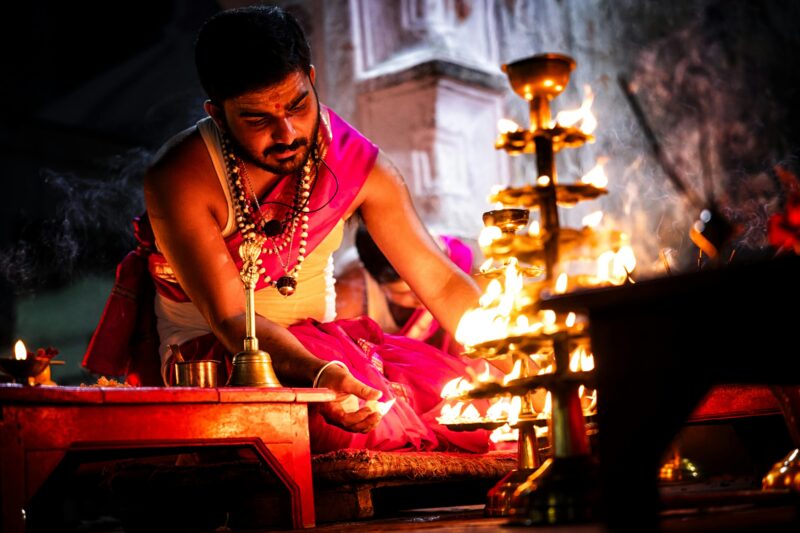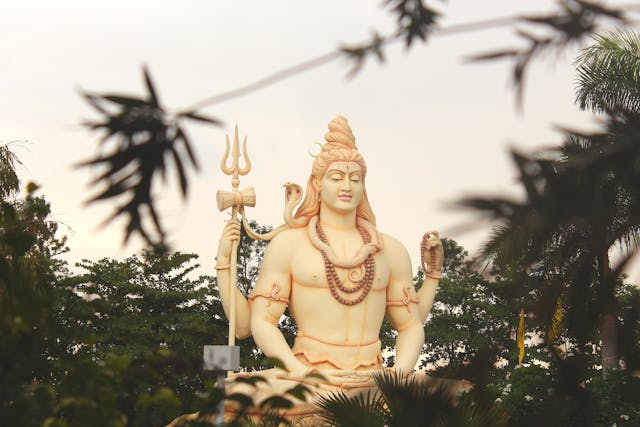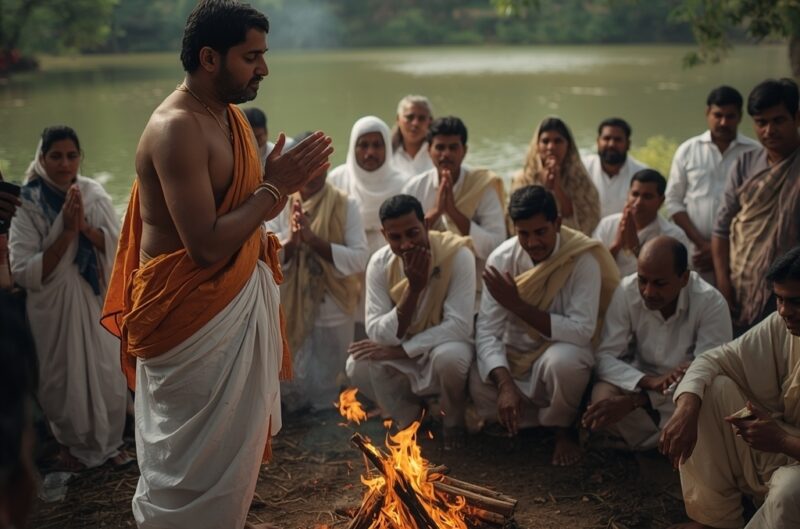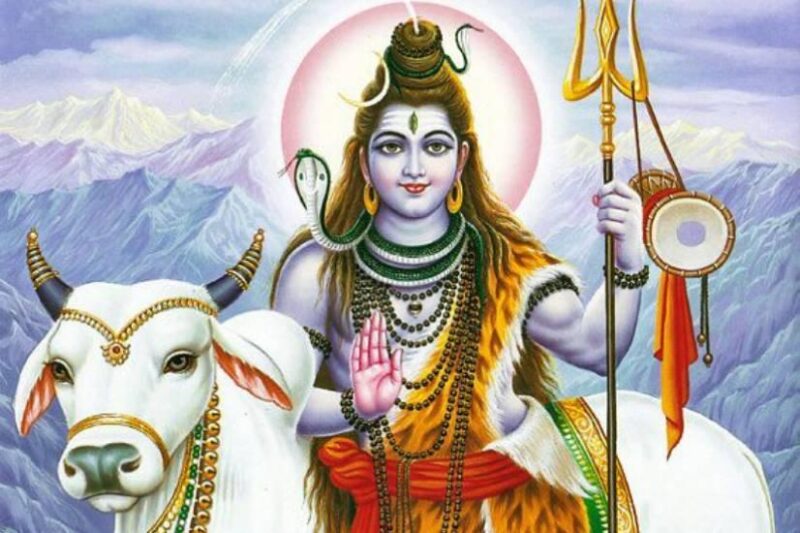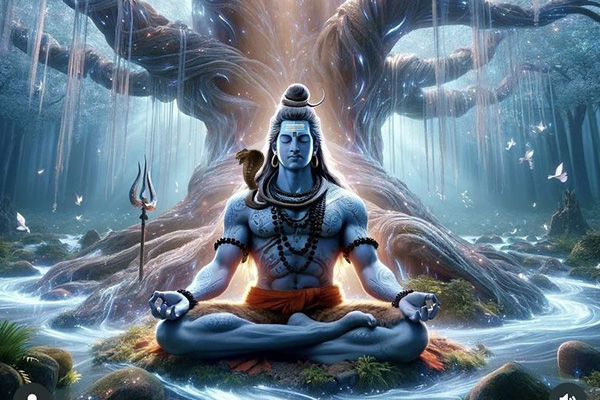Shiv Path, Mantra, Bhajan
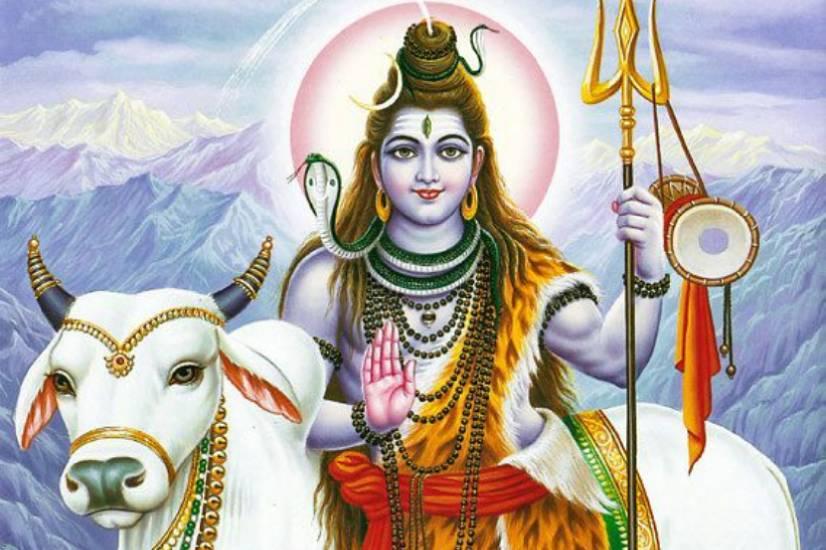
- 🕉️ Shree Shiva Lingashtakam (श्री शिव लिङ्गाष्टकम्)
- 🕉️ Shree Rudrashtakam (श्री रुद्राष्टकम्)
- 🕉️ Shree Shiva Tandava Stotram (श्री शिव तांडव स्तोत्रम्)
- 🕉️ Shree Bilvashtakam (श्री बिल्वाष्टकम्)
- 🕉️ Shree Shivashtakam (श्री शिवाअष्टकम)
- 🕉️ Shree Shiv Chalisa (श्री शिव चालीसा)
- 🕉️ Shree Shiv Mahimna stotra (श्री शिव महिमा स्तोत्र)
1. 🕉️ Shiva Lingashtakam (शिव लिङ्गाष्टकम्) – Shiv Path, Mantra, Bhajan
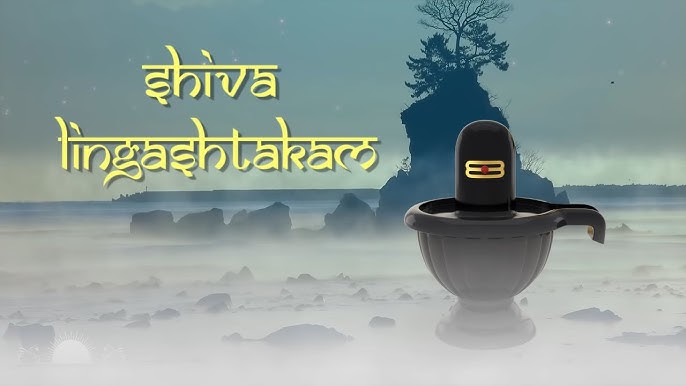
Shiva Lingashtakam or Shiva Linga Ashtakam is a devotional Sanskrit hymn dedicated to Lord Shiva represented by Lingam. Shiv Path, Mantra, Bhajan – The eight Stanzas of Ligashtakam talk about the glory of Shiva linga and claims the holy Shiva Linga is no other than Lord shiva himself.
In the last stanza, it says anyone who chants the holy octet of the Shiva Lingam with great devotion would, in the end, will reach the Shiv Loka.
Shiva Linga Ashtakam may have been popularized by the followers and Gurus of Shaivism after 10 to 12th century CE.
लिङ्गाष्टकम् – Lingashtakam
ब्रह्ममुरारि सुरार्चित लिङ्गं
निर्मलभासित शोभित लिङ्गम् ।
जन्मज दुःख विनाशक लिङ्गं
तत्-प्रणमामि सदाशिव लिङ्गम् ॥ १ ॥
Brahma Muraari Surarchita Lingam
Nirmala Bhaashita Sobhitha Lingam
Janmaja Dhukha Vinaasaha Lingam
Tatpranamaami Sadaashiva Lingam || 1
Meaning: I bow before that Lingam, which is the eternal Shiva,
Which is worshipped by Brahma, Vishnu, and other Devas,
Which is pure and resplendent,
And which destroys sorrows of birth
देवमुनि प्रवरार्चित लिङ्गं
कामदहन करुणाकर लिङ्गम् ।
रावण दर्प विनाशन लिङ्गं
तत्-प्रणमामि सदाशिव लिङ्गम् ॥ २ ॥
Devamuni Pravaraarchita Lingam
Kaama Dahana Karunaakara Lingam
Ravana Darpa Vinaasaha Lingam
Tatpranamaami Sadaashiva Lingam || 2
Meaning: I bow before that Lingam, which is the eternal Shiva,
Which is worshipped by great sages and devas,
Which destroyed the god of love,
Which showers mercy,
And which destroyed the pride of Ravana
सर्व सुगन्ध सुलेपित लिङ्गं
बुद्धि विवर्धन कारण लिङ्गम् ।
सिद्ध सुरासुर वन्दित लिङ्गं
तत्-प्रणमामि सदाशिव लिङ्गम् ॥ ३ ॥
Sarva Sugandha Sulepitha Lingam
Buddhi Vivaardhana Kaarana Lingam
Siddha Suraasura Vandhitha Lingam
Tatpranamaami Sadaashiva Lingam || 3
Meaning: I bow before that Lingam, which is the eternal Shiva,
Which is anointed by perfumes,
Which leads to the growth of wisdom,
And which is worshipped by sages, devas, and asuras
कनक महामणि भूषित लिङ्गं
फणिपति वेष्टित शोभित लिङ्गम् ।
दक्ष सुयज्ञ निनाशन लिङ्गं
तत्-प्रणमामि सदाशिव लिङ्गम् ॥ ४ ॥
Kanaga Mahaamani Bhooshitha Lingam
Panipati Veshthitha Sobitha Lingam
Daksha Suyajna Vinaasana Lingam
Tatpranamaami Sadaashiva Lingam || 4
Meaning: I bow before that Lingam, which is the eternal Shiva,
Which is ornamented by gold, rubies and great jewels,
Which shines with the snake being with it,
And which destroyed the Yagna of Daksha
कुङ्कुम चन्दन लेपित लिङ्गं
पङ्कज हार सुशोभित लिङ्गम् ।
सञ्चित पाप विनाशन लिङ्गं
तत्-प्रणमामि सदाशिव लिङ्गम् ॥ ५ ॥
Kunkuma Chandhana Lehpitha Lingam
Pankaja Haara Susobhitha Lingam
Sanchitha Paapa Vinaashana Lingam
Tatpranamaami Sadaashiva Lingam || 5
Meaning: I bow before that Lingam, which is the eternal Shiva,
Which is adorned by sandal paste and saffron,
Which wears the garland of lotus flowers,
And which can destroy accumulated sins.
देवगणार्चित सेवित लिङ्गं
भावै-र्भक्तिभिरेव च लिङ्गम् ।
दिनकर कोटि प्रभाकर लिङ्गं
तत्-प्रणमामि सदाशिव लिङ्गम् ॥ ६ ॥
Deva Ganaarchita Sevitha Lingam
Bhavair Bhakhi Bhirevacha Lingam
Dinakara Koti Prabhaakara Lingam
Tatpranamaami Sadaashiva Lingam || 6
Meaning: I bow before that Lingam, which is the eternal Shiva,
Which is served by gods and other beings,
Which is the doorway for devotion and good thought,
And which shines like billions of Suns.
अष्टदलोपरिवेष्टित लिङ्गं
सर्वसमुद्भव कारण लिङ्गम् ।
अष्टदरिद्र विनाशन लिङ्गं
तत्-प्रणमामि सदाशिव लिङ्गम् ॥ ७ ॥
Ahshta Dalopari Veshthitha Lingam
Sarva Samudbhava Kaarana Lingam
Ahshta Daridra Vinaasana Lingam
Tatpranamaami Sadaashiva Lingam || 7
Meaning: I bow before that Lingam, which is the eternal Shiva,
Which is surrounded by eight petals,
Which is the prime reason of all riches,
And which destroys eight types of poverty.
सुरगुरु सुरवर पूजित लिङ्गं
सुरवन पुष्प सदार्चित लिङ्गम् ।
परात्परं परमात्मक लिङ्गं
तत्-प्रणमामि सदाशिव लिङ्गम् ॥८॥
Suraguru Suravara Poojitha Lingam
Suravana Pushpa Sadarchitha Lingam
Paraath Param Paramatmaka Lingam
Tatpranamaami Sadaashiva Lingam || 8
Meaning: I bow before that Lingam, which is the eternal Shiva,
Which is worshipped by the teacher of gods,
Which is worshipped by the best of gods,
Which is always worshipped by the flowers,
From the garden of Gods,
Which is the eternal abode,
And which is the ultimate truth.
लिङ्गाष्टकमिदं पुण्यं यः पठेश्शिव सन्निधौ ।
शिवलोकमवाप्नोति शिवेन सह मोदते ॥
Lingashtaka Midam Punyam Yah Pathet Sivasannidhau
Sivaloka Mahaapnoti Sivehna Saha Modatheh ||
Meaning: Anyone who chants the holy octet of the Lingam (Lingashtakam), In the holy presence of Lord Shiva, Would, in the end, reach the world of Shiva, And keep him company.
2. 🕉️ Rudrashtakam (रुद्राष्टकम्) – Shiv Path, Mantra, Bhajan
Composed by Tulsidas, this stotra praises Lord Shiva’s attributes.
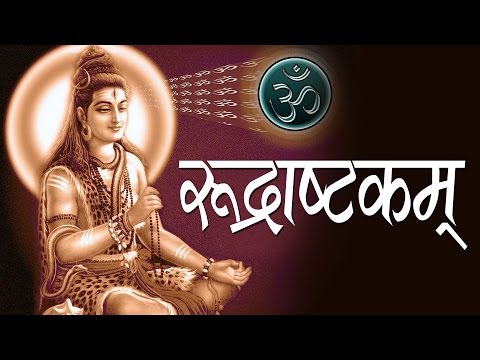
In Sanatana Dharma, Lord Shiva Shankar has the highest position among all the Gods. Shiva is believed to be an easily pleased deity. Even if a devotee offers even a single lota of water to Him with devotion, He becomes pleased. That is why he is also called Bholenath. If you want to get the special grace of Lord Shiva, you should recite ‘Shri Shiva Rudrashtakam’. ‘Shiva Rudrashtakam’ is a wonderful hymn in itself. If any enemy is troubling you, sitting on the seat of Kusha in any Shiva temple or at home and reciting ‘Rudrashtakam’ for 7 consecutive days in the morning and evening, Shiva destroys the biggest enemies in an instant and always protects his devotees. According to the Ramayana, Lord Rama, who was the supreme Purushottam, installed the Shivlinga in Rameshwaram and recited Rudrashtakam Stuti in order to defeat the fierce enemy like Ravana, and as a result, Ravana was killed by the grace of Shiva. Here Shri Shiva Rudrashtakam Stuti and Hindi Arth are given, with the help of which you can recite it.
नमामीशमीशान निर्वाणरूपं। विभुं व्यापकं ब्रह्मवेदस्वरूपं।
निजं निर्गुणं निर्विकल्पं निरीहं। चिदाकाशमाकाशवासं भजे हं॥1॥
Namam Meesana nirvana roopam,Vibhum vyapakam Brahma Veda swaroopam l
Nijam nirgunam nirvikalpam nireeham,Chidakasamaakasa vasam Bhajeham ॥1॥
व्याख्या – हे मोक्षस्वरूप, विभु, ब्रह्म और वेदस्वरूप, ईशान दिशा के ईश्वर व सबके स्वामी श्री शिव जी! मैं आपको नमस्कार करता हूँ. निजस्वरूप में स्थित अर्थात माया आदि से रहित, गुणों से रहित, भेद रहित, इच्छा रहित, चेतन आकाशरूप एवं आकाश को ही वस्त्र रूप में धारण करने वाले दिगम्बर आपको भजता हूँ ॥1॥
Meaning – I bow to the Ruler of the Universe, whose very form is Liberation,the omnipotent and all pervading Brahma, manifest as the Vedas. I worship Shiva, shining in his own glory, without physical qualities,Undifferentiated, desireless, all pervading sky of consciousness and wearing the sky itself as His garment. ||1||
———————————————————————
निराकारमोंकारमूलं तुरीयं। गिरा ग्यान गोतीतमीशं गिरीशं।
करालं महाकाल कालं कृपालं। गुणागार संसारपारं नतो हं॥2॥
Niraakara monkaara moolam thureeyam ,Giraa jnana gotheethamesam gireesam l
Karalam maha kala kalam krupalam,Gunaa gara samsara param athoham ॥2॥
व्याख्या – निराकार, ओंकार के मूल, तुरीय अर्थात तीनों गुणों से अतीत, वाणी, ज्ञान व इंद्रियों से परे, कैलाशपति, विकराल, महाकाल के भी काल, कृपालु, गुणों के धाम, संसार के परे आप परमेश्वर को मैं नमस्कार करता हूँ ॥2॥
Meaning – I bow to the supreme Lord who is the formless source of “Aum” The Self of All, transcending all conditions and states,
Beyond speech, understanding and sense perception, Awe-full, but gracious, the ruler of Kailash, Devourer of Death, the immortal abode of all virtues. ||2||
———————————————————————
तुषाराद्रि संकाश गौरं गम्भीरं। मनोभूत कोटि प्रभा श्री शरीरं।
स्फुरन्मौलि कल्लोलिनी चारु गंगा। लसद्भालबालेन्दु कण्ठे भुजंगा॥3॥
Thushaaraadhi sankasa gowram gabheeram,Mano bhootha koti prabha sree sareeram l
Sphuran mouli kallolini charu ganga,Lasaddala balendu kante bhujanga.l॥3॥
व्याख्या – जो हिमाचल समान गौरवर्ण व गम्भीर हैं, जिनके शरीर में करोड़ों कामदेवों की ज्योति एवं शोभा है, जिनके सर पर सुंदर नदी गंगा जी विराजमान हैं, जिनके ललाट पर द्वितीय का चंद्रमा और गले में सर्प सुशोभित है ॥3॥
Meaning – I worship Shiva, whose form is white as the Himalyan snow, Radiant with the beauty of countless Cupids, Whose head sparkles with river Ganga. With crescent moon adorning his brow and snakes coiling his neck ॥3॥
———————————————————————
चलत्कुण्डलं भ्रू सुनेत्रं विशालं। प्रसन्नाननं नीलकण्ठं दयालं।
मृगाधीशचर्माम्बरं मुण्डमालं। प्रियं शंकरं सर्वनाथं भजामि॥4॥
Chalath kundalam bru sunethram vishaalam,Prasannananam neela kandam dhayalam l
Mrigadheesa charmambaeam munda malam Priyam shankaram sarva nadham bhajami ॥4॥
व्याख्या – जिनके कानों में कुण्डल हिल रहे हैं, सुंदर भृकुटि व विशाल नेत्र हैं, जो प्रसन्नमुख, नीलकंठ व दयालु हैं, सिंहचर्म धारण किये व मुंडमाल पहने हैं, उनके सबके प्यारे, उन सब के नाथ श्री शंकर को मैं भजता हूँ ॥4॥
Meaning – The beloved Lord of All, with shimmering pendants hanging from his ears, Beautiful eyebrows and large eyes, Full of Mercy with a cheerful countenance and a blue speck on his throat ॥4॥
———————————————————————
प्रचण्डं प्रकृष्टं प्रगल्भं परेशं। अखण्डं अजं भानुकोटिप्रकाशम्।
त्रय: शूल निर्मूलनं शूलपाणिं। भजे हं भवानीपतिं भावगम्यं॥5॥
Prachandam prakrushtam Prakalbham paresam,Akhandam ajam bhanu koti prakasam l
Thraya soola nirmoolanam soola panim,Bhajeham bhavani pathim bhava gamyam.
व्याख्या – प्रचण्ड रुद्र रूप, श्रेष्ठ, तेजस्वी, परमेश्वर, अखण्ड, अजन्मा, करोड़ों सूर्यों के समान प्रकाश वाले, तीनों प्रकार के शूलों अर्थात दु:खों को निर्मूल करने वाले, हाथ में त्रिशूल धारण किये, प्रेम के द्वारा प्राप्त होने वाले भवानी के पति श्री शंकर को मैं भजता हूँ ॥5॥
Meaning – I worship Shankara, Bhavani’s husband,The fierce, exalted, luminous supreme Lord.Indivisible, unborn and radiant with the glory of a million suns; Who, holding a trident, tears out the root of the three-fold suffering,And who is reached only through Love ॥5॥
———————————————————————
कलातीत कल्याण कल्पांतकारी। सदासज्जनानन्ददाता पुरारी।
चिदानन्द संदोह मोहापहारी। प्रसीद प्रसीद प्रभो मन्मथारी॥6॥
Kalatheetha kalyani kalpanthakari,Sada sajjananda datha purari l
Chidananda sandoha mohapahari,Praseeda praseeda prabho mamamadhari ॥6॥
व्याख्या – कलाओं से परे, कल्याणस्वरूप, कल्प का अंत, प्रलय करने वाले, सज्जनों को सदा आनन्द देने वाले, त्रिपुर के शत्रु सच्चिनानंदमन, मोह को हरने वाले, प्रसन्न हों, प्रसन्न हों ॥6॥
Meaning – You who are without parts, ever blessed, The cause of universal destruction at the end of each round of creation, A source of perpetual delight to the pure of heart,Slayer of the demon, Tripura, consciousness and bliss personified,
Dispeller of delusion Have mercy on me, foe of Lust ॥6॥
———————————————————————
न यावद् उमानाथ पादारविंदं। भजंतीह लोके परे वा नराणां।
न तावत्सुखं शान्ति सन्तापनाशं। प्रसीद प्रभो सर्वभूताधिवासं॥7॥
Na yavad Umanada padaravindam ,Bhajantheeha loke pare vaa naraanaam l
Na thath sukham shanthi santhapa nasam,Praseedha prabho Sarva bhoothadhivasam l॥7॥
व्याख्या – हे पार्वती के पति, जब तक मनुष्य आपके चरण कमलों को नहीं भजते, तब तक उन्हें न तो इस लोक में न परलोक में सुख शान्ति मिलती है और न ही तापों का नाश होता है. अत: हे समस्त जीवों के अंदर निवास करने वाले प्रभो, प्रसन्न होइये ॥7॥
Meaning – Oh Lord of Uma, so long as you are not worshipped there is no happiness, peace or freedom from suffering in this world or the next. You who dwell in the hearts of all living beings, and in whom all beings have their existence, Have mercy on me, Lord ॥7॥
———————————————————————
न जानामि योगं जपं नैव पूजां। नतो हं सदा सर्वदा शम्भु तुभ्यं।
जराजन्म दु:खौघ तातप्यमानं। प्रभो पाहि आपन्न्मामीश शंभो॥8॥
Na janami yogam, japam ,naiva poojaam,Nathoham sada sarvadha Shambhu thubhyam l
Jara janma dukhogha thathpyamanam,Prabho pahi aapannamameesa Shambho ॥8॥
व्याख्या – मैं न तो जप जानता हूँ, न तप और न ही पूजा. हे प्रभो, मैं तो सदा सर्वदा आपको ही नमन करता हूँ. हे प्रभो, बुढ़ापा व जन्म, मृत्यु, दु:खों से जलाये हुए मुझ दुखी की दुखों से रक्षा करें. हे ईश्वर, मैं आपको नमस्कार करता हूँ ॥8॥
Meaning – I don’t know yoga, prayer or rituals, But everywhere and at every moment, I bow to you, Shambhu ! Protect me my Lord, miserable and afflicted as I am with the sufferings of birth, old-age and death ॥8॥
———————————————————————
रुद्राष्टकमिदं प्रोक्तं विप्रेण हरतोषये।
ये पठन्ति नरा भक्तया तेषां शम्भु: प्रसीदति॥
Rudhrashtakamidham proktham Viprena hara thoshaye l
Ye padanthi naraa bhakthya thesham Shambhu praseedathi ll
व्याख्या – भगवान रुद्र का यह अष्टक उन शंकर जी की स्तुति के लिये है जो मनुष्य इसे प्रेमस्वरूप पढ़ते हैं, श्रीशंकर उन से प्रसन्न होते हैं
Meaning – Lord Rudra’s this ashtakam is for the worship of supreme lord Shiva. The person who chants / reads ashtakam Lord Shiva remains happy with him.
———————————————————————
इति श्री गोस्वामी तुलसिदास कृतम श्रीरुद्राश्ह्टकम संपूर्णम॥
Here ends Sri Goswami Tulsidasa composed Shri Rudra ashtakam ॥
3. 🕉️ Shiva Tandava Stotram (शिव तांडव स्तोत्रम्) – Shiv Path, Mantra, Bhajan
Attributed to Ravana, this stotra describes Lord Shiva’s cosmic dance.
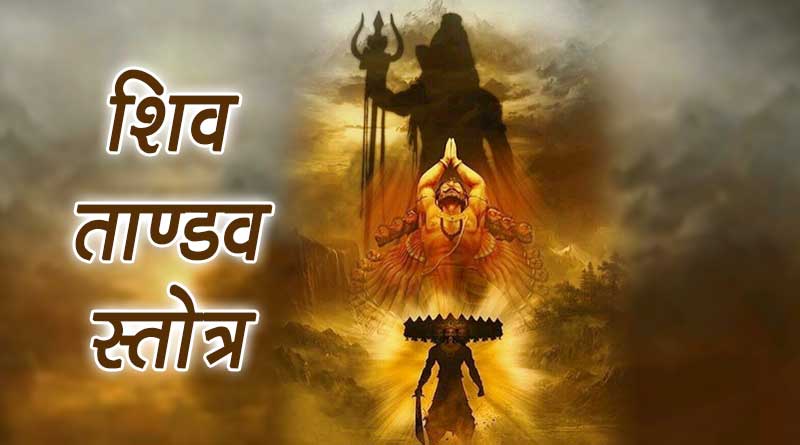
Who wrote shiv tandava stotram lyrics?
Shiv Tandava Stotram is a hymn written and sung by Ravana in praise of Lord Shiva. The Shiv Tandav Stotram represents the cosmic dance of Lord Shiva that eliminates all negative energies. The hymn includes 15 verses and each verse describes the fearless Shiva and his eternal beauty in great detail.
Why did ravana write shiv tandav stotram?
In India, every dominant divine energy has many forms and names. Among the many virtues of Lord Shiva, the most popular one is where Shiva is addressed as Bholenath; it means one who is innocent and easy to please.
The legend goes like this: Lord Shiva granted a boon to anyone who praised him, or performed penance with faith and devotion. All the demons took undue advantage of this and worshiped Lord Shiva as they knew that it was easy to please him and then receive a boon.
Ravana, who was a great priest, administrator, warrior, and devotee of Lord Shiva was known as the demon of demons. He loved himself and his powers a lot.
The story of Shiv Tandav Stotram begins on a day when Ravana tried to lift the Kailash mountain in his hand to take Lord Shiva along with him to Sri Lanka. As a consequence, Lord Shiva pressed his toe, and in the process, crushed the fingers of Ravana. Ravana cried in pain. To escape from the wrath of Lord Shiva, Ravana sang a hymn which came to be known as the popular Shiva Tandav Stotram.
It is said that music is the most powerful tool to please the Lord. Lord Shiva was engrossed in the music of Ravana and became immensely pleased. When Lord Shiva told Ravana to ask for a boon, Ravana requested that the Lord confer him with the most powerful tool and thus, became indestructible.
What are benefits of shiv tandav stotram?
There are innumerable benefits of Shiv Tandav Stotram. Chanting or listening to Shiva Tandava Stotram confers one with immense power, beauty, and mental strength. It is said that chanting the stotram removes all negative energies and makes the atmosphere pious.
When should we chant shiv tandav stotram and how can this benefit us?
Shiva Tandava Stotram has no specific time and anyone can chant it at any time. However, there are some special benefits of chanting it at these times:
1) During an eclipse: It is said that when you chant Om Namah Shivaya or Shiva Tandava Stotram during the time of an eclipse, it reduces all the ill effects of planets. During the eclipse, chanting, meditating, or praying is a hundred times more effective than at other times.
2) During dawn and dusk: It is said that whatever activity you do during Brahma Muhurta, its impact is manifold more. It reduces the amount of energy consumed and doubles the productivity. During dusk, lamps are lit in every house and prayers are offered in many households. Some even conduct satsangs to soak in the positive vibrations.
3) Pradosh Vrat: Pradosh Kaal is the time of the month that falls on the 13th day and is also known as Trayodashi tithi. This tithi falls fortnightly. It is said that chanting Shiva Tandava Stotram on every Trayodashi tithi helps burn sins. Note that Pradosh Kaal varies according to different locations.
How to learn shiv Tandav stotram
It is important to chant this mantra in the right way. These days, many just recite the mantra in a hurry without understanding the meaning and the correct pronunciation.
To learn Shiv Tandav Stotram, you must first listen to it 5-6 times to understand the meaning and pronunciation. After listening, keep practicing and playing the stotram simultaneously. It is recommended to learn the stotram while singing, as it will help you remember it quickly.
Shiv tandav stotram lyrics in sanskrit and english with meaning
जटाटवीगलज्जलप्रवाहपावितस्थले
गलेऽवलम्ब्य लम्बितां भुजङ्गतुङ्गमालिकाम् ।
डमड्डमड्डमड्डमन्निनादवड्डमर्वयं
चकार चण्डताण्डवं तनोतु नः शिवः शिवम् ॥१॥
Jatatavigalajjala pravahapavitasthale
Galeavalambya lambitam bhujangatungamalikam |
Damad damad damaddama ninadavadamarvayam
Chakara chandtandavam tanotu nah shivah shivam ||1||
From Lord Shiva’s matted hair flows the holy river, Ganga consecrating His neck,
From His neck hangs the serpent like a garland,
From His damaru (percussion instrument) comes the damad-damad-damad sound filling the air,
Lord Shiva performs His passionate Tandava dance; may the Lord bless us all!
जटाकटाहसम्भ्रमभ्रमन्निलिम्पनिर्झरी_
विलोलवीचिवल्लरीविराजमानमूर्धनि ।
धगद्धगद्धगज्जलल्ललाटपट्टपावके
किशोरचन्द्रशेखरे रतिः प्रतिक्षणं मम ॥२॥
Jata kata hasambhrama bhramanilimpanirjhari
Vilolavichivalarai virajamanamurdhani |
Dhagadhagadhagajjva lalalata pattapavake
Kishora chandrashekhare ratih pratikshanam mama ||2||
As the rows of waves of the sacred Ganga move through Lord Shiva’s matted hair, it glorifies His Head,
The waves of the river flow into the depths of His locks of hair,
A brilliant fire burns on the surface of Lord Shiva’s forehead,
And the crescent moon is a jewel on His Head.
(May we find constant joy in Him!)
धराधरेन्द्रनन्दिनीविलासबन्धुबन्धुर
स्फुरद्दिगन्तसन्ततिप्रमोदमानमानसे ।
कृपाकटाक्षधोरणीनिरुद्धदुर्धरापदि
क्वचिद्दिगम्बरे मनो विनोदमेतु वस्तुनि ॥३॥
Dharadharendrana ndinivilasabandhubandhura
Sphuradigantasantati pramodamanamanase |
Krupakatakshadhorani nirudhadurdharapadi
Kvachidigambare manovinodametuvastuni ||3||
Salutations to Lord Shiva, who is the sporting consort of the daughter of the mountain king (Parvati),
In whose mind the universe with all the living beings exist,
Whose all-pervading, compassionate glance removes all hardships,
Who wears the directions as His apparel.
(May my mind find bliss in Him!)
जटाभुजङ्गपिङ्गलस्फुरत्फणामणिप्रभा
कदम्बकुङ्कुमद्रवप्रलिप्तदिग्वधूमुखे ।
मदान्धसिन्धुरस्फुरत्त्वगुत्तरीयमेदुरे
मनो विनोदमद्भुतं बिभर्तु भूतभर्तरि ॥४॥
Jata bhujan gapingala sphuratphanamaniprabha
Kadambakunkuma dravapralipta digvadhumukhe |
Madandha sindhu rasphuratvagutariyamedure
Mano vinodamadbhutam bibhartu bhutabhartari ||4||
Salutations to Lord Shiva, who shines radiantly because of the luster of the gem on the reddish-brown hood of the creeping serpent,
Kadambha juice-like red vermilion (kumkum) is smeared on the faces of the Goddesses of direction,
Who wears a cloak made of elephant hide,
May I find pleasure in that Lord of Bhoota! (ghosts – meaning the mystical beings guarding Kailasa)
सहस्रलोचनप्रभृत्यशेषलेखशेखर_
प्रसूनधूलिधोरणी विधूसराङ्घ्रिपीठभूः ।
भुजङ्गराजमालया निबद्धजाटजूटकः
श्रियै चिराय जायतां चकोरबन्धुशेखरः ॥५॥
Sahasra lochana prabhritya sheshalekhashekhara
Prasuna dhulidhorani vidhusaranghripithabhuh |
Bhujangaraja malaya nibaddhajatajutaka
Shriyai chiraya jayatam chakora bandhushekharah ||5||
Salutations to Lord Shiva, whose footrest is decorated by the dust from flowers,
Which fall from the heads of all the gods – Indra, Vishnu and others,
Whose matted locks are bound by the snake-garland,
Whose head holds the moon, a friend of Chakora (a mythical bird that drinks moonlight), as a crown.
(May Lord Shiva bless us with prosperity!)
ललाटचत्वरज्वलद्धनञ्जयस्फुलिङ्गभा_
निपीतपञ्चसायकं नमन्निलिम्पनायकम् ।
सुधामयूखलेखया विराजमानशेखरं
महाकपालिसम्पदेशिरोजटालमस्तु नः ॥६॥
Lalata chatvarajvaladhanajnjayasphulingabha
Nipitapajnchasayakam namannilimpanayakam |
Sudha mayukha lekhaya virajamanashekharam
Maha kapali sampade shirojatalamastu nah ||6||
May Lord Shiva, who devoured the God of Love with the fire burning on His forehead,
Who is revered by the celestial leaders,
Whose forehead is enticing with the gleam and cool rays of the crescent moon,
Shower His blessings on us, so we obtain the wealth of the Siddhis.
करालभालपट्टिकाधगद्धगद्धगज्ज्वलद्_
धनञ्जयाहुतीकृतप्रचण्डपञ्चसायके ।
धराधरेन्द्रनन्दिनीकुचाग्रचित्रपत्रक
प्रकल्पनैकशिल्पिनि त्रिलोचने रतिर्मम ॥७॥
Karala bhala pattikadhagaddhagaddhagajjvala
Ddhanajnjaya hutikruta prachandapajnchasayake |
Dharadharendra nandini kuchagrachitrapatraka
Prakalpanaikashilpini trilochane ratirmama ||7||
Salutations to Lord Shiva, whose forehead burns with a dhagad-dhagad sound,
Who offered the five arrows (of the God of Love) to the fire,
Who is the only artist capable of tracing decorative lines on the tips of the breasts of Parvati, the daughter of the mountain king.
(May we repose in him!)
नवीनमेघमण्डली निरुद्धदुर्धरस्फुरत्_
कुहूनिशीथिनीतमः प्रबन्धबद्धकन्धरः ।
निलिम्पनिर्झरीधरस्तनोतु कृत्तिसिन्धुरः
कलानिधानबन्धुरः श्रियं जगद्धुरंधरः ॥८॥
Navina megha mandali niruddhadurdharasphurat
Kuhu nishithinitamah prabandhabaddhakandharah |
Nilimpanirjhari dharastanotu krutti sindhurah
Kalanidhanabandhurah shriyam jagaddhurandharah ||8||
Salutations to Lord Shiva, whose neck is as dark as layers of dark clouds on the night of the full moon,
Who is enchanting as He wears the moon and celestial river on His head,
Who bears the weight of this universe.
(May He bless us with prosperity!)
प्रफुल्लनीलपङ्कजप्रपञ्चकालिमप्रभा_
वलम्बिकण्ठकन्दलीरुचिप्रबद्धकन्धरम् ।
स्मरच्छिदं पुरच्छिदं भवच्छिदं मखच्छिदं
गजच्छिदान्धकच्छिदं तमन्तकच्छिदं भजे ॥९॥
Praphulla nila pankaja prapajnchakalimchatha
Vdambi kanthakandali raruchi prabaddhakandharam |
Smarachchidam purachchhidam bhavachchidam makhachchidam
Gajachchidandhakachidam tamamtakachchidam bhaje ||9||
Salutations to Lord Shiva, whose neck shines with the brightness of fully-bloomed blue lotus flowers (that temples use),
Which look like the blackness of the universe,
Who destroyed Manmatha (God of Love), Tripura (3 cities),
Who destroyed the bonds of worldly life, and the yagnas (sacrifices),
Who destroyed Andhaka (his blind son), who destroyed the elephant demon (Gajasura), and the God of Death (Yama).
(May He bless us with prosperity!)
अखर्वसर्वमङ्गलाकलाकदम्बमञ्जरी_
रसप्रवाहमाधुरीविजृम्भणामधुव्रतम् ।
स्मरान्तकं पुरान्तकं भवान्तकं मखान्तकं
गजान्तकान्धकान्तकं तमन्तकान्तकं भजे ॥१०॥
Akharvagarvasarvamangala kalakadambamajnjari
Rasapravaha madhuri vijrumbhana madhuvratam |
Smarantakam purantakam bhavantakam makhantakam
Gajantakandhakantakam tamantakantakam bhaje ||10||
Salutations to Lord Shiva, who has bees flying around Him,
Because of the auspicious and sweet scent of the kadambha flowers,
Who destroyed Manmatha (God of Love), Tripura (3 cities),
Who destroyed the bonds of worldly life, and the yagnas (sacrifices),
Who destroyed Andhaka (his blind son), the elephant demon (Gajasura), and the God of Death (Yama).
(May He bless us with prosperity!)
जयत्वदभ्रविभ्रमभ्रमद्भुजङ्गमश्वसद्_
विनिर्गमत्क्रमस्फुरत्करालभालहव्यवाट् ।
धिमिद्धिमिद्धिमिध्वनन्मृदङ्गतुङ्गमङ्गल_
ध्वनिक्रमप्रवर्तितप्रचण्डताण्डवः शिवः ॥११॥
Jayatvadabhravibhrama bhramadbhujangamasafur
Dhigdhigdhi nirgamatkarala bhaal havyavat |
Dhimiddhimiddhimidhva nanmrudangatungamangala
Dhvanikramapravartita prachanda tandavah shivah ||11||
Salutations to Lord Shiva, who has a fire on His forehead, that is ever-increasing
Because of the breath of the snake wandering in the sky,
Whose Tandava dance is in tune with dhimid-dhimid,
Victory to Lord Shiva!
दृषद्विचित्रतल्पयोर्भुजङ्गमौक्तिकस्रजोर्_
गरिष्ठरत्नलोष्ठयोः सुहृद्विपक्षपक्षयोः ।
तृणारविन्दचक्षुषोः प्रजामहीमहेन्द्रयोः
समप्रवृत्तिकः कदा सदाशिवं भजाम्यहम् ॥१२॥
Drushadvichitratalpayor bhujanga mauktikasrajor
Garishtharatnaloshthayoh suhrudvipakshapakshayoh |
Trushnaravindachakshushoh prajamahimahendrayoh
Sama pravartayanmanah kada sadashivam bhajamyaham ||12||
Towards different forms of the world, towards a snake and a garland,
Towards the most precious gem as well as a lump of dirt, and friends and enemies,
Towards a blade of grass or a lotus, towards common people or emperors,
Lord Shiva has an equanimous vision – where can I worship Lord Sadashiva?
कदा निलिम्पनिर्झरीनिकुञ्जकोटरे वसन्
विमुक्तदुर्मतिः सदा शिरःस्थमञ्जलिं वहन् ।
विमुक्तलोललोचनो ललामभाललग्नकः
शिवेति मन्त्रमुच्चरन्कदा सुखी भवाम्यहम् ॥१३॥
Kada nilimpanirjhari nikujnjakotare vasanh
Vimuktadurmatih sada shirah sthamajnjalim vahanh |
Vimuktalolalochano lalamabhalalagnakah
Shiveti mantramuchcharan sada sukhi bhavamyaham ||13||
When can I be happy, living in a cave near the celestial river Ganga,
Clasping my hands together on my head all the time,
Devoted to the Lord with a glorious forehead and with vibrant eyes,
Washing away my impure thoughts with the mantra of Shiva?
इमं हि नित्यमेवमुक्तमुत्तमोत्तमं स्तवं
पठन्स्मरन्ब्रुवन्नरो विशुद्धिमेतिसंततम् ।
हरे गुरौ सुभक्तिमाशु याति नान्यथा गतिं
विमोहनं हि देहिनां सुशङ्करस्य चिन्तनम् ॥१४॥
Imam hi nityameva muktamuttamottamam stavam
Pathansmaran bruvannaro vishuddhimeti santatam |
Hare gurau subhaktimashu yati nanyatha gatim
Vimohanam hi dehinam sushankarasya chintanam ||14||
Anyone who reads, remembers, and recites this stotram
Is purified forever and immerses in deep devotion to the great Guru Shiva leading to salvation.
There is no other way or refuge,
Just the mere thought of Lord Shiva removes the delusion and detachment.
पूजावसानसमये दशवक्त्रगीतं यः
शम्भुपूजनपरं पठति प्रदोषे ।
तस्य स्थिरां रथगजेन्द्रतुरङ्गयुक्तां
लक्ष्मीं सदैव सुमुखीं प्रददाति शम्भुः ॥१५॥
Puja vasanasamaye dashavaktragitam
Yah shambhupujanaparam pathati pradoshhe |
Tasya sthiram rathagajendraturangayuktam
Lakshmim sadaiva sumukhim pradadati shambhuh ||15||
One who recites this song composed by Ravana
At the end of prayer to Lord Shiva early in the morning,
Gets wealth of chariots, elephants, horses.
Lord Shambhu always gives such people prosperity.
Om Namah Shivay!!
4. 🕉️ Shree Bilvashtakam (श्री बिल्वाष्टकम्) – Shiv Path, Mantra, Bhajan
This hymn extols the significance of offering Bilva leaves to Lord Shiva.
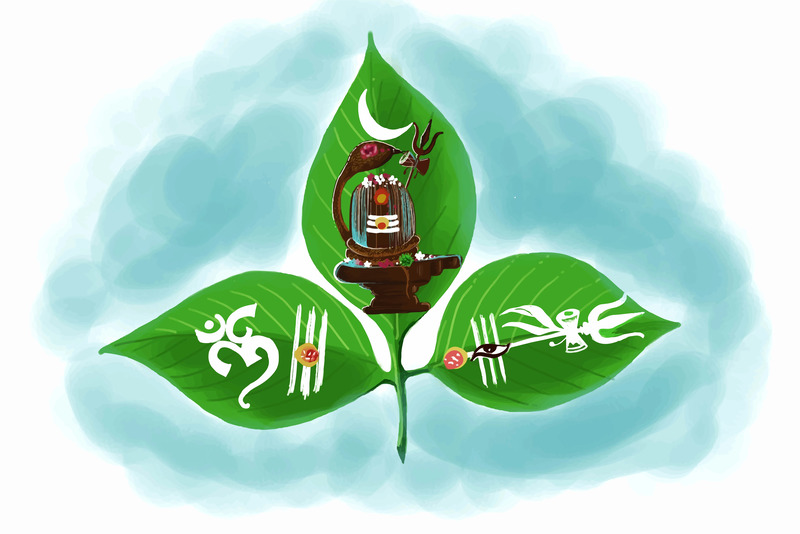
Sri Siva Bilvashtakam is written by Jagadguru Sri Adi Shankaracharya. This is a very impressive mantra, which conveys the power and splendor of Shiva by offering the Belpatra to him.
On the day of Mahashivratri, he is worshiped by meditation, fasting, abhishek and puja throughout the night in Shiva temples. Bel leaves are mainly used in the worship on this day.
Bilvashtakam has 8 verses in the name of Shivaji i.e. Ashtakam. More than 8 verses will also be found in some books. Here we have taken Ashtakam of only 8 verses, recite these verses while offering Belpatra.
Belpatra is used only in the worship of Lord Shiva. It is written in Shiva Purana, that belapatra is a symbol of 3 eyes of Shiva, and offering one belapatra to Shiva is like offering a thousand lotus flowers. According to Skanda Purana, the drops of sweat of Goddess Parvati that fell on Mandarchal mountain took the form of this Belpatra tree. Therefore, Goddess Parvati is worshiped in her many forms in this tree, as root-Girja, as Tana-Maheshwari, Mandalas- as Dakshayani, Parvati in leaves, Gauri in flowers and Katyayani in fruits. That is why it is said that Shivaji is very pleased with the offering of Belpatra. It is also believed that this bel tree is the symbol of tridevas – Brahma, Vishnu and Shiva. This is also one of the reasons that this tree is the most revered. The name Belpatra refers not only to Belpatra, but also to all the leaves that are used in worship. These are the names of 8 leaves – Tulsi, Bel, Shiwari Shivali, Chirchita (Chircita), Kabit (Kaith), Shami, Amla and Durva Ghas. But only beel leaves are used in the worship of Shiva. It is also believed that a beel tree in which a fruit has come once, offering the beel leaves of that tree to Shiva doubles his happiness.
Now we explain the importance of Belpatra in Shiva Puja through Bilvashtakam.
त्रिदलं त्रिगुणाकारं त्रिनॆत्रं च त्रियायुधं
त्रिजन्म पापसंहारम् ऎकबिल्वं शिवार्पणं
Tridalam trigunakaram trinetram cha triyayudham
Trijanmapapasamharam ekabilvam shivarpanam
त्रिशाखैः बिल्वपत्रैश्च अच्चिद्रैः कॊमलैः शुभैः
तवपूजां करिष्यामि ऎकबिल्वं शिवार्पणं
Trishakhaih bilvapatraishcha hyachchidraih komalaih shubhaih
Tavavapujam karishhyami ekabilvam shivarpanam
कॊटि कन्या महादानं तिलपर्वत कॊटयः
काञ्चनं क्षीलदानॆन ऎकबिल्वं शिवार्पणं
Koti kanya maha danam tila parvata kotayah
Kanchanam sheela danena ekabilvam shivarpanam
काशीक्षॆत्र निवासं च कालभैरव दर्शनं
प्रयागॆ माधवं दृष्ट्वा ऎकबिल्वं शिवार्पणं
Kashikshetranivasam cha kalabhairavadarshanam
Prayagamadhavam druishtva ekabilvam shivarpanam
इन्दुवारॆ व्रतं स्थित्वा निराहारॊ महॆश्वराः
नक्तं हौष्यामि दॆवॆश ऎकबिल्वं शिवार्पणं
Induvare vratam sthitwa niraharo maheshwara
Naktam haoushyami devecha eka bilvam shivarpanam
रामलिङ्ग प्रतिष्ठा च वैवाहिक कृतं तधा
तटाकानिच सन्धानम् ऎकबिल्वं शिवार्पणं
Ramalinga pratistha cha vaivahika krutam tatha
tatakadi cha santanam eka bilvam shivarpanam
अखण्ड बिल्वपत्रं च आयुतं शिवपूजनं
कृतं नाम सहस्रॆण ऎकबिल्वं शिवार्पणं
Akhanda bilva patram cha ayutam shiva poojanam
Krutam nama sahasrena eka bilvam shivarpanam
उमया सहदॆवॆश नन्दि वाहनमॆव च
भस्मलॆपन सर्वाङ्गम् ऎकबिल्वं शिवार्पणं
Umaya sahadevesha nandi vahana meva cha
Bhasma lepana sarvangam eka bilvam shivarpanam
सालग्रामॆषु विप्राणां तटाकं दशकूपयॊः
यज्नकॊटि सहस्रस्च ऎकबिल्वं शिवार्पणं
Salagrameshu vipranam tatakam dasha koopayo
Yagyakoti saharacha eka bilvam shivarpanam
दन्ति कॊटि सहस्रॆषु अश्वमॆध शतक्रतौ
कॊटिकन्या महादानम् ऎकबिल्वं शिवार्पणं
Dantikoti sahasreshu ashwamedha shatakratau
Kotikanya mahadanam ekabilvam shivarpanam
बिल्वाणां दर्शनं पुण्यं स्पर्शनं पापनाशनं
अघॊर पापसंहारम् ऎकबिल्वं शिवार्पणं
Bilvanam darshanam punyam sparshanam papa nashanam
Aghora papa samharam eka bilvam shivarpanam
सहस्रवॆद पाटॆषु ब्रह्मस्तापन मुच्यतॆ
अनॆकव्रत कॊटीनाम् ऎकबिल्वं शिवार्पणं
Sahasra veda patheshu brahma sthapana muchyate
Aneka vrata kotinam eka bilvam shivarpanam
अन्नदान सहस्रॆषु सहस्रॊप नयनं तधा
अनॆक जन्मपापानि ऎकबिल्वं शिवार्पणं
Annadana sahasreshu sahasropanayanam tatha
Aneka janma papani eka bilvam shivarpanam
बिल्वस्तॊत्रमिदं पुण्यं यः पठॆश्शिव सन्निधौ
शिवलॊकमवाप्नॊति ऎकबिल्वं शिवार्पणं
Bilvashhtakamidam punyam yah patheth shivasannidhau.
shivalokamavapnoti eka bilvam shivarpanam
5. 🕉️ शिवाष्टकम् (Shivāṣṭakam) – Shiv Path, Mantra, Bhajan
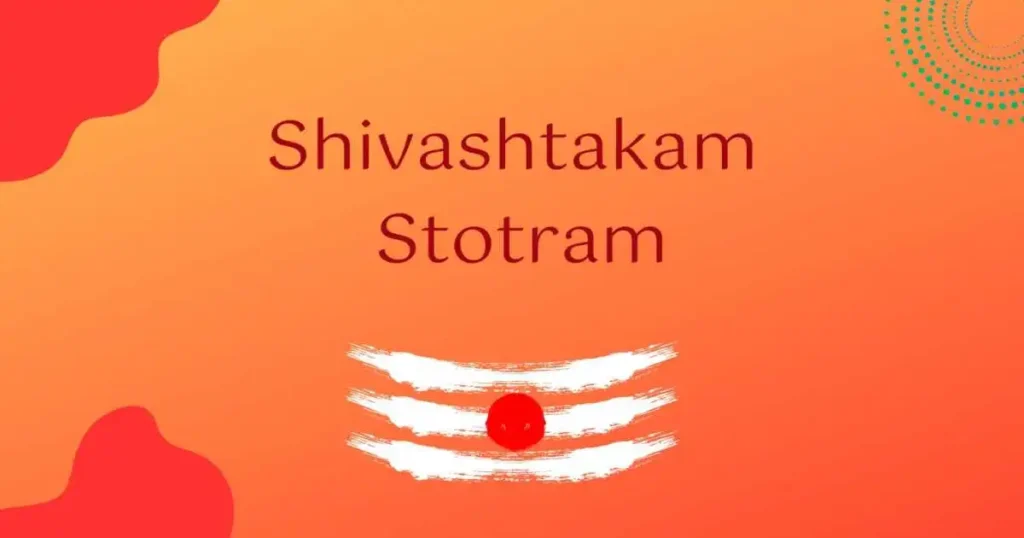
Sanskrit:
प्रभो शम्भो त्रैलोक्यगुरो श्रीशिव शंकर शम्भो महेश।
गङ्गाधर शङ्कर शूलपाणे मृड प्रणम्यं शमीश शिवार्ध॥
Transliteration:
Prabho Śambho Trailokya-Guro Śrīśiva Śaṅkara Śambho Maheśa
Gaṅgādhara Śaṅkara Śūlapāṇe Mṛḍa Praṇamyaṁ Śamīśa Śivārdha
Meaning:
O Lord Shiva, preceptor of the three worlds, all-auspicious one, bearer of the Ganga, wielder of the trident, my salutations to you—the compassionate Lord and consort of Parvati.
Sanskrit:
नमो निर्मल निर्विकार स्वरूप नमो निष्कल निश्चल निर्विकल्प।
नमो निर्विशेषाय निर्माय शम्भो नमः शुद्ध चिन्मात्र मूर्ते नमस्ते॥
Transliteration:
Namo Nirmala Nirvikāra Svarūpa Namo Niṣkala Niścala Nirvikalpa
Namo Nirviśeṣāya Nirmāya Śambho Namaḥ Śuddha Cinmātra Mūrte Namaste
Meaning:
Salutations to the pure and unchanging essence; to the formless, unmoving, and absolute Lord. I bow to the one beyond attributes and illusion, to Shiva, the embodiment of pure consciousness.
Sanskrit:
भवद्भावभीतोऽहमेकस्त्वदीय कृपावाग्दृशां सन्निधाने।
भवानीपतिः शङ्कर त्वं ममेति उच्यते मन्यतां निश्चलं मे॥
Transliteration:
Bhavadbhāva Bhīto’ham Ekas Tvadīya Kṛpāvāk Dṛśāṁ Sannidhāne
Bhavānīpatiḥ Śaṅkara Tvaṁ Mameti Ucyate Manyatāṁ Niścalaṁ Me
Meaning:
I am terrified by the cycle of birth and death and seek your refuge, O Shiva. May you, the Lord of Bhavani, consider me yours with unwavering grace.
Sanskrit:
न जानामि योगं जपं नैव पूजां नतोऽहं सदा सर्वदा शम्भु तुभ्यम्।
जरा जन्म दुःखौघ तातप्यमानं प्रभो पाहि पापेभ्यः मां शम्भु॥
Transliteration:
Na Jānāmi Yogaṁ Japaṁ Naiva Pūjāṁ Natosmi Sadā Sarvadā Śambhu Tubhyam
Jarā Janma Duḥkhaugha Tātapyamānaṁ Prabho Pāhi Pāpebhyaḥ Māṁ Śambhu
Meaning:
I do not know yoga, japa, or rituals; I only bow to you constantly. Tormented by suffering and rebirth, O Shiva, please save me from sin.
Sanskrit:
रुद्राय शुद्धाय नमोऽस्तु नित्यं प्रसन्नात्मने कालरूपाय तेऽस्तु।
सदा योगयुक्ताय योगाधिपाय नमः शङ्करायाम्बिकेशाय तुभ्यम्॥
Transliteration:
Rudrāya Śuddhāya Namo’stu Nityaṁ Prasannātmanē Kālarūpāya Te’stu
Sadā Yogayuktāya Yogādhipāya Namaḥ Śaṅkarāyāmbikeśāya Tubhyam
Meaning:
Salutations to Rudra, the pure and ever-serene one, the embodiment of time. Always united in yoga, master of yogis—salutations to Shankara, the Lord of Ambika.
Sanskrit:
गिरीशं गणेशं गले नीलवर्णं गवां पाति वीणाहृतं चारुहासम्।
सदा भासमानं शिवं मे नमामीश्वरं शर्वमद्भुतस्वरूपम्॥
Transliteration:
Girīśaṁ Gaṇeśaṁ Gale Nīlavarṇaṁ Gavāṁ Pāti Vīṇāhṛtaṁ Cāruhāsam
Sadā Bhāsamānaṁ Śivaṁ Me Namāmīśvaraṁ Śarvam Adbhutasvarūpam
Meaning:
I bow to Shiva, Lord of the mountains and father of Ganesha, blue-throated, protector of cows, veena holder, and ever-radiant with a divine smile—the wondrous form of the Supreme.
Sanskrit:
एकदाचित्कलौ कल्पके वारिदे या मया मन्दबुद्ध्या कृतं नाम चापि।
तदैव स्मरन्यस्तपापः प्रभो मे नमः शम्भवे शान्तयै ते नमोऽस्तु॥
Transliteration:
Kadācit Kalau Kalpake Vāridē Yā Mayā Mandabuddhyā Kṛtaṁ Nāma Cāpi
Tadaiva Smara Nyasta Pāpaḥ Prabho Me Namaḥ Śambhave Śāntyayai Te Namo’stu
Meaning:
Whatever wrongs I may have done in this dark age of Kali, due to ignorance, let them be absolved through remembrance of your holy name, O Shambhu. I bow to you for peace and grace.
Sanskrit:
शिवाष्टकं यः पठति प्रदोषे नरेण स शम्भोः प्रीयताम्यः।
इदं यः पठेद्भक्तिपूर्वं नरः स याति शिवं शाश्वतं चामृतात्मानम्॥
Transliteration:
Śivāṣṭakaṁ Yaḥ Paṭhati Pradoṣe Nareṇa Sa Śambhoḥ Prīyatāṁ Yaḥ
Idaṁ Yaḥ Paṭhed Bhaktipūrvaṁ Naraḥ Sa Yāti Śivaṁ Śāśvataṁ Cāmṛtātmānam
Meaning:
Whoever recites this Shivāṣṭakam during twilight (Pradosha time) with devotion pleases Lord Shiva and attains His eternal, immortal form.
Why Devotees in the UK Seek a Hindu Priest
Whether you are in London or anywhere in the UK, many devotees recite the Shiv Chalisa to connect with Lord Shiva. A Hindu priest in London or a Hindu priest UK wide can guide families in performing Shiv puja, Rudrabhishek, and Maha Mrityunjaya Yajnas.
6. 🕉 Shiv Chalisa (शिव चालीसा) – Shiv Path, Mantra, Bhajan
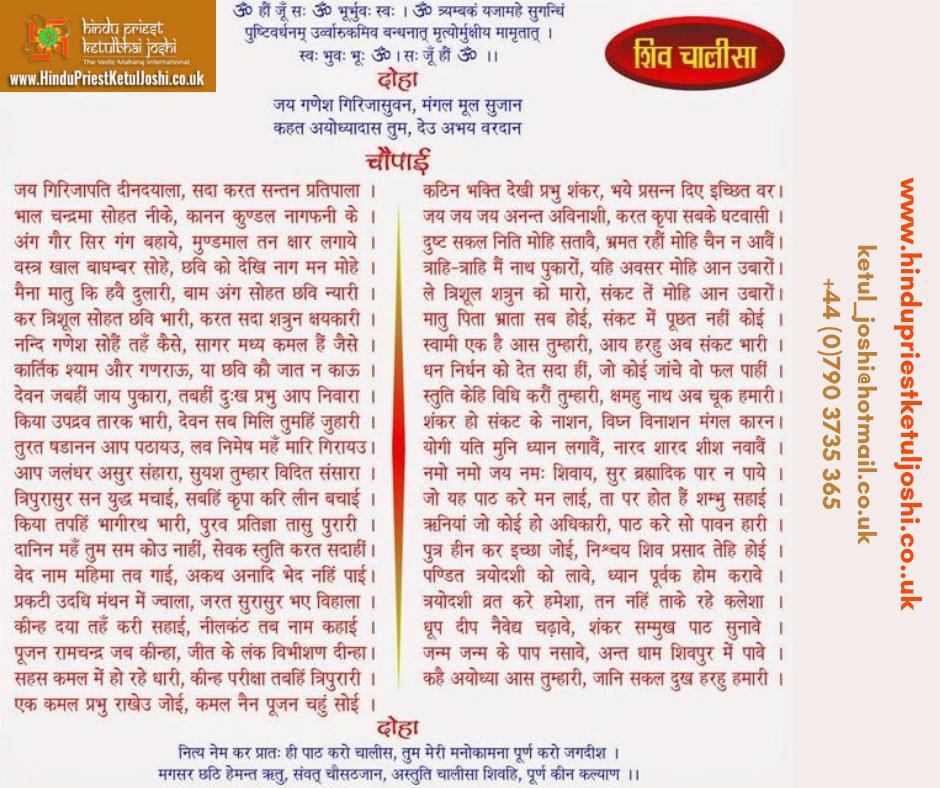
With Sanskrit, Transliteration & Meaning in English
Benefits of Chanting Shiv Chalisa
- Removes fear, illness, and negativity
- Brings peace, clarity, and spiritual upliftment
- Invokes Lord Shiva’s blessings for protection and wisdom
Doha (Opening Couplet)
Sanskrit:
जय गणेश गिरिजा सुवन, मंगल मूल सुजान।
कहत अयोध्यादास तुम, देहु अभय वरदान॥
Transliteration:
Jaya Gaṇeśa Girijā Suvana, Maṅgala Mūla Sujāna।
Kahata Ayodhyādāsa Tuma, Dehu Abhaya Varadāna॥
Meaning:
Victory to Lord Ganesha, son of Goddess Girija (Parvati), the source of all good fortune and wisdom. Ayodhya Das prays: Grant me your fearless blessing, O Lord.
Shiv Chalisa Verses
Sanskrit:
शम्भु चन्द्रमा शेखर, महिमा अमित बड़ी।
मनु बुद्धि रथा चढ़ि, हरि गावत गुणखड़ी॥
Transliteration:
Śambhu Candramā Śekhara, Mahimā Amit Baṛī।
Manu Buddhi Rathā Caṛhi, Hari Gāvat Guṇakhaṛī॥
Meaning:
Shiva, crowned with the moon, your glory is infinite. Riding the chariot of mind and intellect, I sing your divine virtues.
जय गिरिजा पति दीनदयाला।
सदा करत सन्तन प्रतिपाला॥
Jaya Girijā Pati Dīnadayālā।
Sadā Karata Santana Pratipālā॥
Victory to the compassionate consort of Parvati, the constant protector of saints and devotees.
भाल चन्द्रमा सोहत नीके।
कानन कुण्डल नागफनी के॥
Bhāla Candramā Sohata Nīke।
Kānan Kuṇḍala Nāgaphanī Ke॥
The crescent moon shines beautifully on your forehead, and serpent earrings adorn your ears.
अंग गौर सिर गंग बहाए।
मुण्डमाल तन छार लगाए॥
Aṅga Gaur Sira Gaṅgā Bahāye।
Muṇḍamāla Tana Chāra Lagāye॥
Your fair body glows as the Ganga flows from your hair; you wear a garland of skulls and are smeared with ash.
वस्त्र खाल बाघम्बर सोहे।
छवि को देख नाग मन मोहे॥
Vastra Khāl Bāghambara Sohe।
Chavi Ko Dekha Nāga Mana Mohe॥
Clad in tiger skin, your appearance enchants even serpents who gaze upon your divine beauty.
मैना मातु की हवे दुलारी।
बाम अंग सोहत छवि न्यारी॥
Mainā Mātu Kī Have Dulārī।
Bām Aṅga Sohata Chavi Nyārī॥
Parvati, daughter of the mountain, sits gracefully on your left, radiating divine charm.
कर त्रिशूल सोहत छवि भारी।
करत सदा शत्रुन क्षयकारी॥
Kara Triśūla Sohata Chavi Bhārī।
Karata Sadā Śatrun Kṣayakārī॥
The powerful trident in your hand brings awe, and it constantly destroys the enemies of righteousness.
नन्दि गणेश सोहै तहँ कैसे।
सागर मध्य कमल हैं जैसे॥
Nandi Gaṇeśa Sohai Tahaṁ Kaise।
Sāgara Madhya Kamala Haiṁ Jaise॥
Nandi and Ganesha shine in your divine court like lotuses blooming in the ocean of bliss.
कार्तिक श्याम और गणराऊ।
या छवि को कहि जात न काऊ॥
Kārtika Śyāma Aura Gaṇarāū।
Yā Chavi Ko Kahi Jāta Na Kāū॥
Your sons Kartikeya and Ganesha are radiant beyond words; none can describe the splendor of your divine family.
देव दानव मुनि सब पूजा।
ताप त्रय मिटावत दूजा॥
Deva Dānava Muni Saba Pūjā।
Tāpa Traya Miṭāvat Dūjā॥
All gods, demons, and sages worship you. You alone relieve the three types of worldly suffering.
You are easily pleased by even the smallest offering, and protect those who come to you with devotion. You burned Kamadeva to ashes, showing detachment and power. Your compassion frees your devotees from the fear of death and worldly illusion.
O Lord of Kailash, you are served by Bhairava and the ghosts, yet you are beyond all fear. Even Vishnu and Brahma bow to you. Those who chant your name with love are never lost or forsaken.
By smearing sacred ash and wearing rudraksha, devotees draw closer to your divine energy. Your blessings turn the poorest into kings. You are the Lord of All, destroyer of sin, and savior of those trapped in illusion.
I surrender to you completely, Shiva. Lift me from the darkness of ego and ignorance. Show me the path of truth and wisdom. I know nothing of rituals or mantras—only that you are my eternal refuge.
Protect me from the snares of lust, anger, greed, and attachment. Help me master my mind, and grant me eternal devotion at your feet.
Doha (Closing Couplet)
Sanskrit:
शिव चालीसा जो नर गावे।
अयोध्या दास सहज सुख पावे॥
Transliteration:
Śiva Chālīsā Jo Nara Gāve।
Ayodhyā Dāsa Sahaja Sukha Pāve॥
Meaning:
Whoever recites this Shiv Chalisa with devotion will attain peace and happiness, says Ayodhya Das.
Connect with a Hindu Priest in London or UK
For those looking to hold a special puja, chanting event, or Rudrabhishek in their home or temple, a Hindu priest in London brings traditional Vedic knowledge to your family. Many people across the UK engage a Hindu priest to perform the Shiv Chalisa or Shiv Maha puran, shiv katha, Shiv sarvodaya, shiv gita, sansar gita, shiv rudri puja or Rudrabhishek and explain its meaning with devotion. contact Hindu priest ketul joshi: +44 079 0373 5365.
Whether it’s Maha Shivaratri, Shravan month, or a personal sankalp, hiring a Hindu priest UK ensures your prayers are offered with purity and precision.
If you’re planning a religious event, consider booking a Hindu priest UK or a Hindu priest in London who understands both Vedic tradition and modern family needs. Whether it’s for a home puja, temple celebration, or festival, having a knowledgeable Hindu priest brings grace and authenticity to your rituals.
7. 🕉️ Shree Shiv Mahimna stotra (श्री शिव महिमा स्तोत्र) – Shiv Path, Mantra, Bhajan
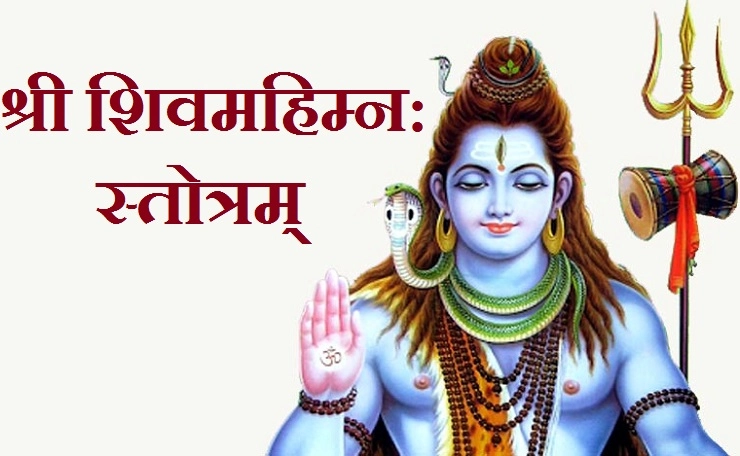
It’s all about Shiv mahimna stotra!!
The Shiva Mahimna Stotra is very popular among the devotees of Lord Shiva and is considered one of the best among all Stotras (or Stutis) offered to Lord Shiva. The legend about the circumstances leading to the composition of this Stotra is as follows.
The Legends behind Shiv Mahimna stotra-(Story of Pushpadanta)
A king named Chitraratha had constructed a nice garden. There were beautiful flowers in this garden. These flowers were used every day by the king to worship Lord Shiva. One day a Gandharva (Heavenly Singer in the court of Indra, the Lord of the Heaven) named Pushhpadanta being fascinated by the beautiful flowers, began to steal them, as a consequence of which king Chitraratha could not offer flowers to Lord Shiva. He tried very hard to capture the thief, but in vain, because the Gandharvas have divine power to remain invisible.
Finally, the king spread the Shiva Nirmaalya in his garden. Shiva Nirmaalya consists of the Bilva leaves, flowers, etc. which have been used in worshipping Lord Shiva. The Shiva Nirmaalya is considered holy.
The thief Pushhpadanta, not knowing this, walked on the Shiva Nirmaalya, and by that he incurred the wrath of Lord Shiva and lost the divine power of invisibility. He then designed a prayer to Lord Shiva for forgiveness. In this prayer, he has sung the greatness of the Lord.
This very prayer became well known as the ‘Shiva Mahimna Stotra’. Lord Shiva became pleased by this Stotra, and returned Pushhpadanta’s divine powers.
Benefits of Shiv Mahimna Stotra
Whoever recites the Shiv Mahimna Stotra, rejoices in the worship of Shiva.
It helps in overcoming fear.
Whoever recites this Shiv Mahimna Stotra receives the divine grace of Lord Shiva.
Whoever recites this Shiv Mahimna Stotra, all his sins are destroyed.
Shiv Mahimna stotra Lyrics and meanings:
Shiv Mahimna Stotram – (1)
mahimnah param te parama vidusho yadyasadrishi
stutir brahma dina mapitadava sannastvayi girah,
atha vacyah sarvah svamati parina mavadhi grinan
mamapyeshah stotre hara nirapavadah parikarah(More..)
